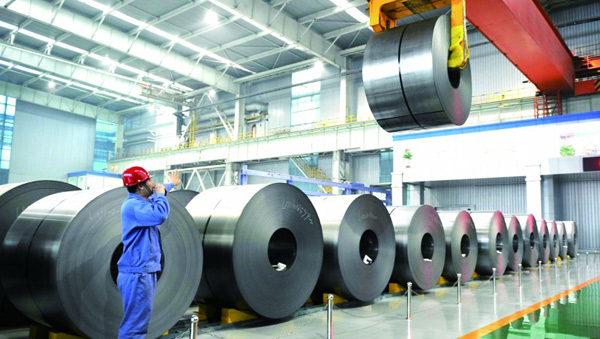


(File photo)
The State Council, China's cabinet, has announced plans to cut steel production capacity by 100 million tons over the next five years.
The country will also not approve any new coal mines before the end of 2019.
This move is part of supply-side reform measures that are aimed at curbing overcapacity in the two sectors.
As the world's largest coal producer and consumer, massive coal production has powered China's economic advance over the past few decades.
But shrinking domestic demand amid an economic slowdown has made much of this capacity redundant.
Wang Xianzheng, Chairman of the China's China Coal Industry Association, says China is facing its highest-ever coal inventories.
"Due to declining market demand, inventories keep rising. China now has more than 300-million tons of coal inventories. This has reached a historically high level. Meanwhile, the drop in coal prices has led to a significant amount of defaulted payments to coal companies, which has brought difficulties to their business."
Ninety percent of the companies in the coal industry are now suffering loses.
The same glut has also been felt in China's steel industry, especially in the past two years, as world steel demand contracted.
According to China Iron and Steel Association, China's crude steel production capacity is about 1.2 billion tons with output falling 2.3 percent last year.
Li Xinchuang, head of China Metallurgical Industry Planning and Research Institute, says that steel prices are much lower than that 20 years ago.
"The decline of consumption will lead to an oversupply and disordered competition in the market. The steel price has sunk to its lowest point in history, nearly 40 percent lower than the price index in 1994. Nearly half of the member companies of the China Iron and Steel Association now face losses. The total deficit hit 72-billion yuan in the first ten months of last year."
Li Xinchuang says if the situation continues to worsen, some companies face production halts or even closures, which will lead to huge financial losses as these firms default on loans.
To address the problem, Yang Weimin, vice director of the Office of the Central Leading Group on Finance and Economic Affairs, says these "zombie" companies, those which have ceased operations but have not formally gone bankrupt, must be shut down.
"If the "zombie" companies are not eradicated, demand stimulation and investment expansion cannot play their proper role in boosting the economy. And high quality companies will be dragged down in the future. We need to firmly shut down those "zombie" companies to balance the demand and supply in the industry and inject confidence in the high quality companies."
To slash the overcapacity, no new steel projects have been given the go ahead since May of 2013.
The country will also shut down 500 million tons of coal capacity and consolidate another 500 million tons into the hands of fewer but more efficient mine operators in the next three to five years.
Resettlement of workers will be a top priority with coal and steel producers set to offer compensation to redundant workers and to pay their unpaid wages.
Relevant authorities have pledged to provide training and employment services to help the unemployed find work and make plans to pay unemployment benefits to those who may lose their jobs.
 Have you ever taken these beautiful subways in China?
Have you ever taken these beautiful subways in China? Chinese beauties, foreign models meet in Chengdu
Chinese beauties, foreign models meet in Chengdu Awesome! Aerial pictures taken on J-11 fighter
Awesome! Aerial pictures taken on J-11 fighter A foreign girl explains what China should be proud of
A foreign girl explains what China should be proud of Chinese navy's air-cushioned landing craft in pictures
Chinese navy's air-cushioned landing craft in pictures Chinese pole dancing master opens class in Tianjin
Chinese pole dancing master opens class in Tianjin Splendid Sichuan after snow
Splendid Sichuan after snow College girl of Vancouver crowned Miss Chinese Int'l 2016
College girl of Vancouver crowned Miss Chinese Int'l 2016 Pentagonal Mart becomes the largest vacant building in Shanghai
Pentagonal Mart becomes the largest vacant building in Shanghai Top 20 hottest women in the world in 2014
Top 20 hottest women in the world in 2014 Top 10 hardest languages to learn
Top 10 hardest languages to learn 10 Chinese female stars with most beautiful faces
10 Chinese female stars with most beautiful faces China’s Top 10 Unique Bridges, Highways and Roads
China’s Top 10 Unique Bridges, Highways and Roads After spate of espionage allegations, US law firm opens first China office
After spate of espionage allegations, US law firm opens first China office Author Feng Tang attacks decision to pull book from shelves
Author Feng Tang attacks decision to pull book from shelves Going ape for New Year
Going ape for New Year Black lungs
Black lungsDay|Week